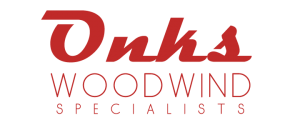Post 51: What is your favorite brand of oboe out there today?
I recently had a conversation with an oboist friend of mine from graduate school regarding the tuning of a particular note on her oboe. During our conversation, my friend asked me, “What is your favorite brand of oboe out there today?” I would like to say that this is an easy question to answer, and maybe it is for a career oboist who’s only played one brand. For those of us in the sales and/or repair industry, we see many brands and models of each brand which makes this question very difficult to answer. Another factor that makes it hard to answer has to do with our human biases. If you’re in sales, your favorite oboe brand will be the one that you sell. You can be the most ethical salesperson on the planet, but 99% of the time you’re going to recommend the oboes you sell. There isn’t anything wrong with this, it’s just the way it is.
Here at Onks Woodwind we are in a unique position when it comes to this question because we’re not in sales. As I am writing this, Onks Woodwind is strictly a repair shop. We don’t sell instruments or accessories, so from a business standpoint we can remain objective and provide insight that will truly benefit our clients. As professional players, we do have personal biases to contend with, but I feel we bypass those tendencies when advising our clients.
Undoubtedly by now you’re asking, “So what was the answer to the question?” Well, my answer doesn’t really involve a brand name. We live in a modern, high tech world which is vastly different than the days when Alfred Laubin made his first oboe (1931). Due to computerized machinery, oboe makers have extremely precise tooling. Some of the oboe makers not only have precise tools, but they use computer-guided machines to manufacture the oboe bodies, which leaves you with an amazingly precise product. So in light of these modern advancements there are many amazing oboe brands available. This is not only true for the top of the line professional models, but student models as well. The days of plastic oboes being manufactured only for students are gone! There are many different materials out there today being made into oboes that professional and students alike are utilizing to their advantage.
So my answer to the question is, “An oboe that is mechanically sound and is easily played.” Ok, so maybe my biases are showing. As an oboe repair specialist, I’ve seen very expensive oboes in disrepair and nonfunctional, mostly due to a lack of expert maintenance. It doesn’t matter how expensive an oboe is if it isn’t functional. At that point it’s just a paperweight! In today’s world, if you purchase a reputable brand and maintain the oboe annually, you will have an excellent oboe, period! For most students through high school and even into college, all reputable brands will give you excellent tuning, response, and overall sound. The rest will be up to you as a player and the reeds you choose.
So you may ask, “What are the reputable brands?” This question can easily be answered using, once again, modern technology. Google! If there is a brand you are interested in, can you google the name and easily find a manufacturer’s website? Even if you cannot purchase directly from the manufacturer, you should be able to find them and see company history, instruments they manufacture, model descriptions, dealers, pictures and contact information. If you google a name and you can’t find a manufacturer’s website and it’s only available on Ebay, stay away!! Purchasing a reputable brand will insure availability of parts, repair of catastrophic damage by the manufacturer, local or regional dealer support and resale value in the future. (Hiniker Oboes is one exception to the manufacturer website rule. Tom Hiniker is a small boutique oboe maker in Minnesota. His oboes are fantastic. There is a 10+ year waiting list and he does not have a website at this time.)
If you are in the market to purchase an oboe, below are a few suggestions and questions for you to ponder during the process:
- Create an oboe “Board of Directors”. These are people you can consult during the buying process. By the way, this also goes for professional oboists, too. Making these decisions can be daunting and tiresome, there is no shame in getting help and the opinions of others.
- Don’t choose the cheapest.
- Choose from reputable brands for ease of repairability, warranties, future resale value, etc.
- If there’s a brand you’re curious about but haven’t heard of, ask your board and/or try to find manufacturer information.
- Keep in mind, an oboe purchase is not for life. If you ultimately decide after a period of time that the oboe you purchased isn’t for you, make a plan to sell it and purchase your next oboe.
- What is your budget? Do not blow your budget or stop funding retirement to purchase a $12,000.00 oboe for a beginner oboist (or any oboist for that matter) if you cannot afford it.
- Ongoing Expenses: Once an oboe is purchased, you should plan to set aside 8-10% of your purchase price to go towards annual maintenance.
- How old is the player? Again, it is not necessary to purchase a $12,000.00 oboe for a beginner, but it could be more reasonable for an upper college student pursuing oboe performance.
- What are your goals? Are you going to play for fun into adulthood? Are you going to play solos in your small church? Are you going to play in community band/orchestra? Professional orchestra or collegiate professor?
- Do you want to deal with cracking? If you simply don’t want to worry about the wood of your oboe cracking, there are oboes being made out of many different materials and oboes with bore liners which eliminate cracking.
- Where are you mostly going to be playing? Huge drafty symphonic stage? Cold drafty opera/musical pit? Outside? Small band hall? Church? Answering these questions can help you decide what type of material you should consider for your oboe.
- New or used? This can usually be answered by referring to your budget and where you are in your life stage of oboe playing. Used oboes can be just as awesome as new ones, assuming they have been maintained well and do not have bore damage.
There are many factors that go into the oboe purchase decision. Get advice, use your budget, consider where you are going with your playing and consider the environment you will be playing in. If you answer all of these questions, do lots of research and take your time, you will undoubtedly make a good decision. Oboe playing should be fun and, with help, there isn’t any reason purchasing an oboe shouldn’t be fun also. Information and time are always your friends!
If there are any questions Onks Woodwind can help you with regarding anything oboe, don’t hesitate to contact us!
Blessings,
Jason Onks




Leave a Reply
Want to join the discussion?Feel free to contribute!